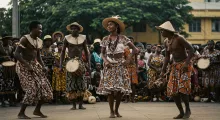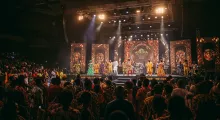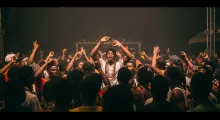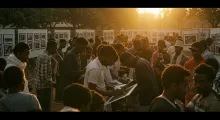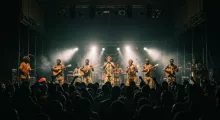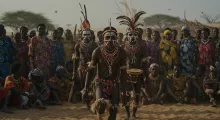Introduction
Every December, Lagos, Nigeria, transforms into the beating heart of Africa’s entertainment scene. Among the many events that define the vibrant month fondly nicknamed “Detty December,” one name consistently stands out: Flytime Fest. Established as one of the continent’s most anticipated music and cultural festivals, Flytime Fest has grown into a week-long showcase of world-class entertainment, fusing Nigeria’s rich musical heritage with global sounds. Hosted in Lagos—the bustling commercial and cultural hub of West Africa—the festival attracts thousands of fans, top-tier local and international performers, and entertainment enthusiasts from across the world.
But Flytime Fest is not just about concerts. It is a cultural movement, a symbol of Nigeria’s growing dominance in global music, and a testament to the energy and creativity that define Lagos. From its roots in the early 2000s to its present-day grandeur, the festival mirrors the evolution of Afrobeats and the city’s reputation as Africa’s cultural capital.
This article explores the history, growth, and significance of Flytime Fest, while also looking ahead at its future and the role it plays in shaping both Nigeria’s entertainment landscape and the global music industry.
Origins and Evolution of Flytime Fest
Flytime Fest is the brainchild of Flytime Promotions, a pioneering entertainment company founded by Cecil Hammond. The company had been producing concerts and events for years, but in 2004, they introduced a brand that would eventually evolve into a December staple: the Rhythm Unplugged Concert. Rhythm Unplugged began as a single-day event showcasing some of Nigeria’s best performers. It quickly gained traction and set the stage for what would later become Flytime Fest.
By the mid-2010s, Nigeria’s music industry was exploding, with Afrobeats gaining international recognition. Flytime Promotions seized this opportunity to expand its offerings. In 2018, Rhythm Unplugged was rebranded and scaled up into Flytime Fest, a multi-day music festival designed to not only feature Nigeria’s brightest stars but also to bring in global acts.
Today, Flytime Fest is no longer just a concert—it’s an annual cultural phenomenon. It brings together multiple events, themed concerts, artist-curated nights, and electrifying performances under one banner. The festival usually takes place at Eko Convention Centre or other large-scale venues in Lagos, attracting capacity crowds night after night.
The Festival Experience: What Makes Flytime Special
Flytime Fest is unlike any other festival in Africa. It combines world-class production quality with the distinct energy of Lagos nightlife. Fans attend not just to watch their favorite artists but to experience something much bigger:
- Multiple Nights of Music: Instead of a single-day concert, Flytime Fest typically spans four to five days, with each day having a unique theme or headliner.
- Eclectic Lineups: The festival blends genres, featuring Afrobeats, hip hop, R&B, reggae, dancehall, and pop. Nigerian superstars share the stage with international icons, creating a melting pot of sound.
- Immersive Atmosphere: From stage lighting and sound to fashion and food, Flytime Fest offers an immersive cultural experience. Lagosians come dressed to impress, adding a unique flavor to the audience vibe.
- December Energy (“Detty December”): Lagos in December is a hotspot for concerts, weddings, club nights, and reunions. Flytime Fest is often considered the crown jewel of this season.
Headline Acts and Iconic Performances
Over the years, Flytime Fest has attracted an impressive list of performers. The festival has featured both Nigerian superstars and international heavyweights, often creating unforgettable moments. Some highlights include:
- Davido: A regular face at the festival, Davido has used the Flytime stage to showcase his evolution from local star to international Afrobeats ambassador.
- Wizkid: Known for his magnetic performances, Wizkid has headlined several editions, drawing record-breaking crowds.
- Burna Boy: Before winning a Grammy, Burna Boy had already cemented his reputation at Flytime Fest with electrifying sets.
- Tiwa Savage: Nigeria’s queen of Afrobeats has consistently delivered high-energy, fashion-forward performances.
- Kizz Daniel: Beloved for his catchy hits, Kizz Daniel has brought the crowd to life on numerous occasions.
- International Stars: Flytime Fest has hosted major international acts like Cardi B, Megan Thee Stallion, Trey Songz, and Bobby Brown, bridging Lagos with global music scenes.
These performances highlight Flytime Fest’s mission: to create a world-class festival that places Lagos firmly on the global entertainment map.
Economic and Cultural Impact
Flytime Fest is more than music—it’s an economic driver and a cultural showcase.
- Boost to Tourism: Lagos receives an influx of visitors during December. Many diaspora Nigerians plan their trips around Flytime Fest, contributing to hotel bookings, restaurants, transport services, and nightlife.
- Job Creation: From event planners to sound engineers, caterers, makeup artists, fashion designers, and security personnel, the festival employs hundreds of people each year.
- Brand Partnerships: Flytime Fest has consistently attracted corporate sponsorships from global brands like Pepsi, Heineken, and Access Bank, showing the commercial viability of Nigeria’s music industry.
- Cultural Pride: Flytime Fest is a showcase of Nigerian excellence. It demonstrates that Lagos can host a festival on par with Coachella, Glastonbury, or Rolling Loud.
- Diaspora Connection: The event fosters connections between Nigerians at home and in the diaspora, strengthening cultural identity and pride.
Lagos as the Backdrop
Flytime Fest thrives in Lagos for a reason. The city is Nigeria’s cultural capital, known for its nonstop energy, nightlife, and diversity. Hosting the event in Lagos also ties it directly to the origins of Afrobeats, which was born in Nigeria but has since conquered the world.
During December, Lagos is at its peak vibrancy. Luxury cars line the streets, celebrities mingle with fans, and the entire city feels like a stage. Flytime Fest captures this essence perfectly, serving as a microcosm of Lagos itself—chaotic, energetic, creative, and unforgettable.
Flytime Fest and the Rise of Afrobeats
The festival has played a crucial role in globalizing Afrobeats. By giving Nigerian artists a platform to perform alongside international stars, Flytime Fest has facilitated cultural exchange and amplified Nigeria’s sound globally.
When international acts like Cardi B or Megan Thee Stallion share the stage with Nigerian stars, it validates Afrobeats as a genre that can stand shoulder-to-shoulder with any global music style. For many foreign artists, performing at Flytime Fest is their introduction to Lagos’ magic—and it often sparks collaborations with African acts.
The Audience: A Celebration of Diversity
Flytime Fest attracts an audience as diverse as its performers. Attendees include:
- Young Nigerians who see the festival as the highlight of their December.
- Diaspora Africans returning home for the holidays.
- International fans traveling specifically to witness Afrobeats in its natural habitat.
- Celebrities, influencers, and industry leaders who use the festival as a networking platform.
Together, this creates a melting pot of cultures and styles, making Flytime Fest not just a concert but a cultural meeting ground.
Future Outlook
As Flytime Fest continues to grow, its trajectory points toward even greater global influence. There are talks of expanding the brand into other African cities or even exporting the festival abroad, much like Afro Nation has done. However, Lagos will likely remain its spiritual home.
With Afrobeats now firmly entrenched in global pop culture, Flytime Fest is poised to become Africa’s Coachella—a festival where fans from all over the world converge to celebrate not just music but African creativity as a whole.
Conclusion
Flytime Fest is more than a December event—it is a cultural landmark. Born from Rhythm Unplugged’s humble beginnings, it has transformed into a global spectacle that embodies Lagos’ vibrancy, Nigeria’s musical power, and Africa’s cultural confidence. Each December, it offers unforgettable nights of music, fashion, and cultural exchange, while boosting the local economy and putting Nigeria at the center of the world’s entertainment conversation.
For anyone who wants to experience the true spirit of Lagos—its energy, its music, its nightlife—Flytime Fest is the place to be. It is not just a concert series; it is a celebration of Africa’s past, present, and future in music and culture.

